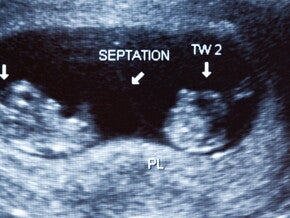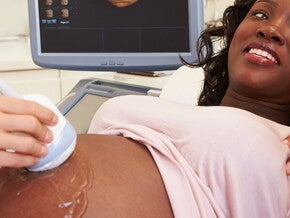
Signs of labour
The following signs of labour may occur in any order.
1. Progressive contractions
A contraction is the periodic, wave-like tightening and relaxing of the uterine muscles. The abdomen will become very hard to the touch as the uterus contracts and reaches its peak and then, as it begins to fade, it softens.
Timespan of a contraction, from the beginning of one contraction to the beginning of the next.

Contractions are felt in different places – in the front, as an exaggerated menstrual cramp or gastric-like cramp (front labour), or in the back (back labour), possibly radiating to the front. Occasionally labour may be felt in the thighs. Contractions are intermittent, with a rest period after each one.
Contractions will get longer, stronger and closer together as labour progresses. Find out from your caregiver when to go into hospital – usually once contractions last longer than 45 seconds and are less than 10 minutes apart.
2. Show – loss of mucous plug from cervix
During pregnancy a mucous plug develops in the cervical canal to seal off the cervix. It often dislodges as a mucous discharge, possibly streaked with blood, when the cervix begins to change (approximately 24–48 hours before active labour). This is not a reliable sign of labour, as it can be dislodged during intercourse or a vaginal
examination. Wait for another sign of labour before going to the clinic or hospital.
3. Rupture of membrane
A gush or uncontrollable leakage of the colourless amniotic fluid, which cannot be stopped by contracting the pelvic floor, is an indication that your membranes have ruptured.
Notify your doctor if this happens.
Don’t bath, douche or have intercourse after this happens. Sometimes the membranes remain intact until the end of the first stage of labour. You and your doctor will decide when to artificially rupture the membranes, if necessary.
Precautions
- Green waters – If the amniotic fluid is stained green, it could mean that your baby has passed meconium (contents of bowel), which may indicate foetal distress. The baby should be monitored immediately upon arrival at the hospital.
- Should you experience excessive bleeding, notify your caregiver at once.

















